Isotretinoin, sold under the brand name Isofair in Australia, is one of the most powerful treatments for severe acne. It’s not a quick fix-it’s a months-long journey that can change your skin, your confidence, and sometimes your life. But it’s not the only option. If you’re considering Isofair, you’re probably tired of creams, antibiotics, and endless dermatologist visits. You want results. But you also want to know: are there safer, gentler, or cheaper ways to get there?
What Is Isofair (Isotretinoin) Really Doing?
Isotretinoin is a synthetic form of vitamin A. It doesn’t just treat acne-it attacks the root causes. It shrinks oil glands by up to 90%, cuts sebum production dramatically, kills acne-causing bacteria, and reduces inflammation. For many, it’s the only thing that works when nothing else does. Studies show that 80-90% of people who complete a full course see long-term clearance. Some never get acne back.
But it’s not gentle. Dry skin, cracked lips, nosebleeds, joint pain, and mood changes are common. In rare cases, it’s linked to depression and inflammatory bowel disease. In Australia, you can’t buy Isofair over the counter. You need a prescription, regular blood tests, and a doctor who monitors you closely. It’s a treatment that demands respect.
Top Alternatives to Isofair for Acne
If you’re nervous about isotretinoin-or your doctor says it’s not right for you-there are other paths. Here are the most effective alternatives backed by clinical evidence.
1. Oral Antibiotics (Doxycycline, Minocycline)
These are the go-to for moderate to severe inflammatory acne. They reduce bacteria and calm inflammation. Doxycycline is often first-line because it’s affordable and effective. But it’s not a cure. You’ll likely need to take it for 3-6 months, and acne often returns after you stop. Long-term use can lead to antibiotic resistance, which is why doctors now avoid prescribing them for more than a year.
2. Hormonal Therapies (Spironolactone, Birth Control Pills)
For women with hormonal acne-breakouts around the jawline, chin, or neck that flare before periods-hormonal treatments can be game-changers. Spironolactone blocks androgen receptors, which reduces oil production. Birth control pills like Yaz or Diane-35 lower testosterone levels. Many women see improvement within 2-3 months. Side effects include breast tenderness, headaches, and irregular bleeding. Not for men, obviously.
3. Topical Retinoids (Adapalene, Tretinoin)
These are vitamin A derivatives you apply directly to the skin. Adapalene (available over-the-counter in 0.1% strength in Australia) unclogs pores and prevents new acne from forming. Tretinoin is stronger and prescription-only. They work slowly-expect 8-12 weeks before you see results. They can cause peeling and sun sensitivity. But they’re safe for long-term use and are often paired with antibiotics or benzoyl peroxide.
4. Benzoyl Peroxide and Azelaic Acid
Benzoyl peroxide kills acne bacteria and reduces inflammation. It’s available in 2.5%, 5%, and 10% strengths. Start low-2.5% is just as effective as 10% but much gentler. Azelaic acid (15-20%) is a lesser-known gem. It fights bacteria, reduces redness, and even fades post-acne dark spots. Both are safe during pregnancy and can be used long-term.
5. Light and Laser Therapies
Blue light therapy kills acne bacteria. Red light reduces inflammation. Some clinics combine both. It’s non-invasive and has almost no side effects. But it’s expensive-$100-$200 per session, and you need 6-12 sessions. Results are moderate and temporary. Best for people who can’t take oral meds or want to avoid them.
Comparison Table: Isofair vs. Alternatives
| Treatment | Effectiveness | Time to Results | Side Effects | Duration of Use | Long-Term Clearance |
|---|---|---|---|---|---|
| Isofair (Isotretinoin) | Very High | 8-16 weeks | Dry skin, lips, nosebleeds, mood changes, liver enzyme changes | 4-6 months (one course) | Up to 85% after one course |
| Oral Antibiotics | Moderate to High | 4-8 weeks | Stomach upset, sun sensitivity, antibiotic resistance | 3-6 months (max 1 year) | Low to moderate (often returns) |
| Hormonal Therapy (Spironolactone) | High (for hormonal acne) | 2-4 months | Breast tenderness, fatigue, menstrual changes | 6+ months (often long-term) | High if continued |
| Topical Retinoids | Moderate | 8-12 weeks | Peeling, redness, sun sensitivity | Indefinite | Moderate (prevents new acne) |
| Benzoyl Peroxide | Moderate | 4-6 weeks | Dryness, bleaching of fabrics | Indefinite | Low (controls, doesn’t cure) |
| Light Therapy | Mild to Moderate | 4-8 weeks | Minimal | Weekly for 6-12 sessions | Low (requires maintenance) |
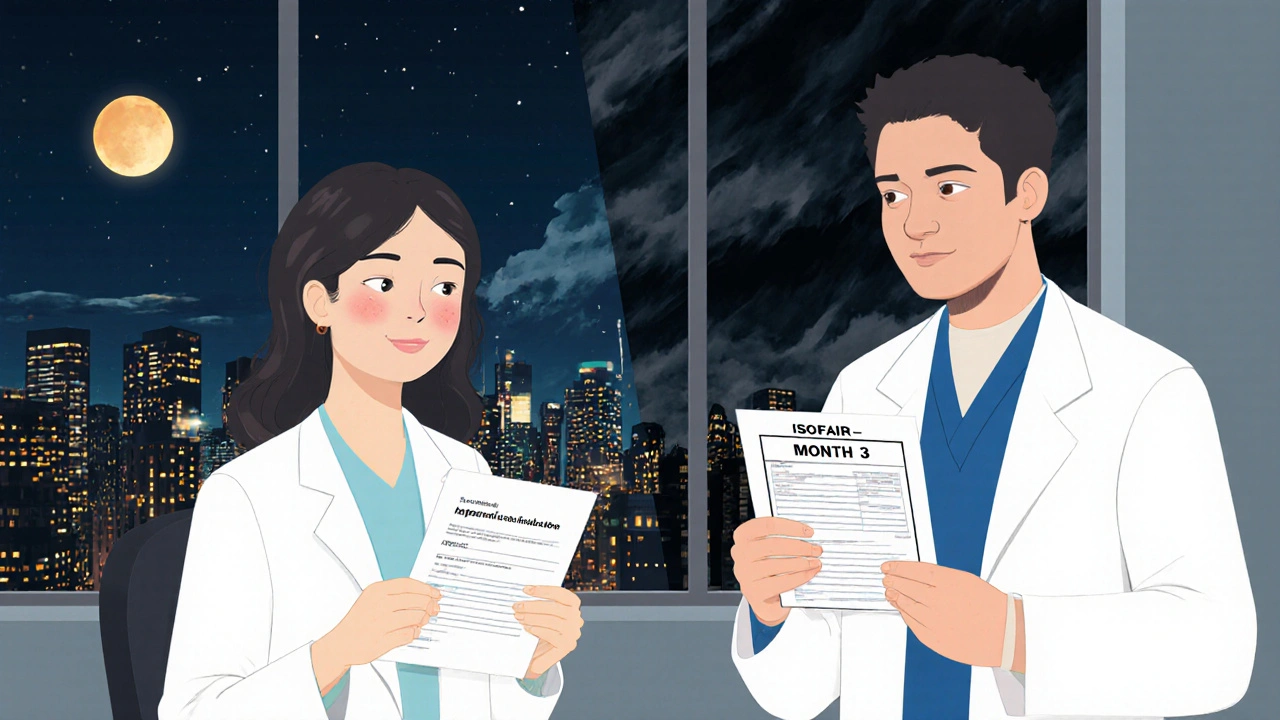
When Isofair Is the Best Choice
Not everyone needs isotretinoin. But if you have:
- Nodular or cystic acne (deep, painful lumps under the skin)
- Acne that’s left scars or dark marks despite trying other treatments
- Acne that’s affecting your mental health-social anxiety, depression, low self-esteem
- Failed at least two courses of antibiotics or other therapies
Then Isofair might be your best shot at lasting freedom. It’s not a last resort-it’s a targeted solution for severe cases. Many patients say it gave them their life back.
When to Avoid Isofair
Isofair isn’t for everyone. Avoid it if you:
- Are pregnant or planning pregnancy (it causes severe birth defects)
- Have liver disease or high triglycerides
- Have a history of depression or suicidal thoughts (talk to your doctor first)
- Are under 12 years old
- Can’t commit to monthly blood tests and strict contraception
Also, don’t use it if you’re hoping for a quick fix. It takes months. And you’ll need to be patient during the first few weeks-some people get worse before they get better.
What About Natural Remedies?
You’ll see ads for tea tree oil, zinc supplements, or “acne detoxes.” Some people swear by them. But here’s the truth: there’s no strong scientific proof that any natural remedy matches isotretinoin’s effectiveness. Tea tree oil can help mild acne, but it’s not strong enough for cystic acne. Zinc might reduce inflammation slightly, but not enough to replace medication.
Natural doesn’t mean safe. Some herbal supplements interact with Isofair or other medications. Always tell your doctor what you’re taking-even if it’s “just a supplement.”
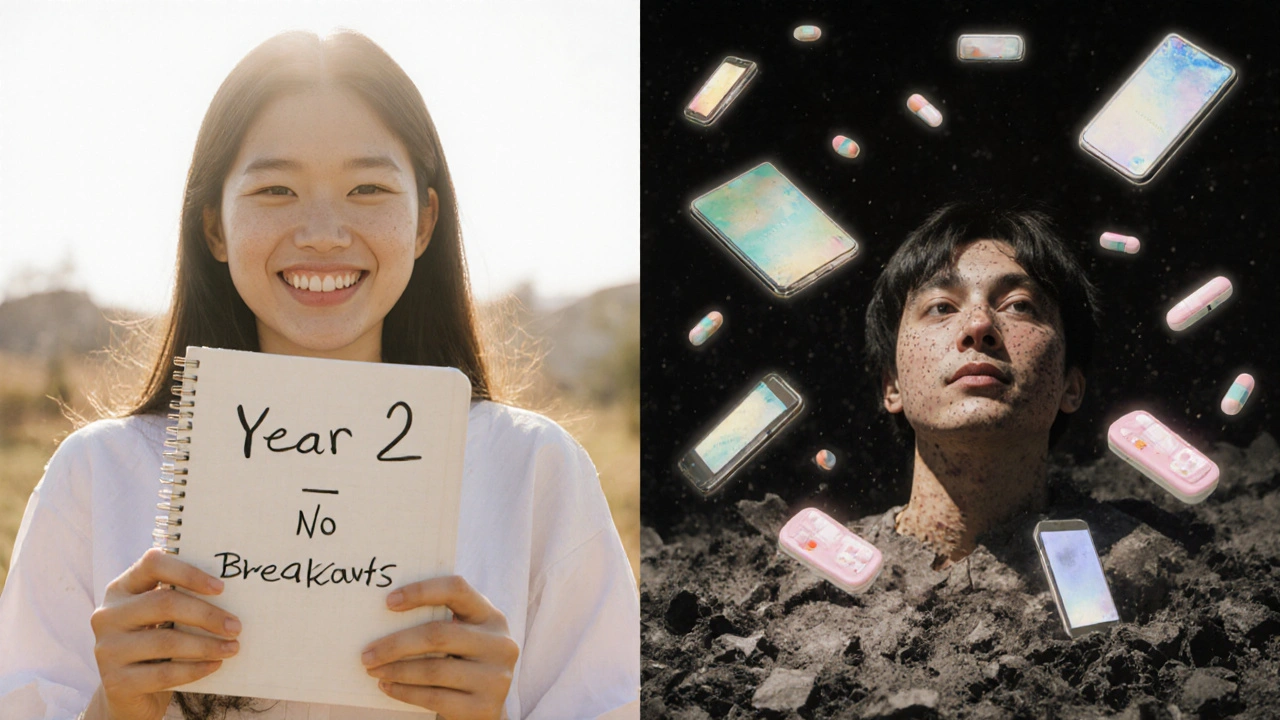
Real Stories: What People Actually Experience
Emma, 24, from Brisbane, tried antibiotics for two years. Nothing worked. Her face was covered in cysts. She started Isofair. The first month was rough-her lips cracked, her skin peeled. But by month four, her skin cleared. Two years later, she hasn’t had a breakout. “It was the hardest thing I’ve ever done,” she says. “But I’d do it again.”
Mark, 31, from Melbourne, has hormonal acne. He tried Isofair but got severe dry eyes. His dermatologist switched him to spironolactone. After six months, his breakouts dropped by 80%. He’s been on it for three years. “It’s not perfect,” he says. “But I don’t need to hide my face anymore.”
These aren’t outliers. They’re common outcomes. The key is matching the treatment to the person-not the other way around.
How to Decide What’s Right for You
Here’s a simple decision flow:
- Is your acne mild (blackheads, small pimples)? Try topical retinoids + benzoyl peroxide.
- Is it moderate (red bumps, some pus-filled)? Add an oral antibiotic for 3-6 months.
- Is it severe (deep cysts, scarring, no improvement after 6 months of other treatments)? Talk to your dermatologist about Isofair.
- Are you a woman with jawline acne that flares before your period? Ask about spironolactone or birth control.
- Do you want to avoid pills? Try light therapy-but be ready for multiple sessions and ongoing costs.
There’s no one-size-fits-all. But there is a right path for you.
Final Thoughts: It’s About Your Life, Not Just Your Skin
Acne isn’t just a skin problem. It’s a mental one. It affects sleep, confidence, relationships, job interviews. Isofair isn’t magic. But for many, it’s the only treatment that gives back their life. The alternatives work-some better than others. But none match its power to deliver lasting results.
Don’t rush into Isofair. Don’t avoid it out of fear. Talk to a dermatologist who knows your history, your skin, and your goals. Ask questions. Get blood tests. Understand the risks. Then make your choice-not based on Instagram trends or YouTube videos, but on facts, experience, and your own needs.
Your skin will thank you. But more than that-you will.
Is Isofair the same as isotretinoin?
Yes. Isofair is the brand name for isotretinoin in Australia and some other countries. The active ingredient is identical. Generic versions of isotretinoin are also available and work the same way. The difference is only in price and packaging-not effectiveness.
Can I take Isofair without a prescription?
No. Isofair is a Schedule 4 prescription-only medication in Australia. It’s illegal to buy it online without a valid prescription. Many websites selling it without one are scams or sell counterfeit pills. Always get it through a licensed doctor and pharmacy.
How long does it take for Isofair to work?
Most people start seeing improvement after 8-12 weeks. Some get worse in the first 4-6 weeks-that’s normal. The full effect usually takes 4-6 months. You’ll need to finish the full course, even if your skin clears early, to reduce the chance of acne coming back.
Does Isofair cause weight gain?
Weight gain isn’t a common side effect of isotretinoin. Some people report increased appetite, but studies don’t show consistent weight gain. If you notice sudden weight changes, talk to your doctor-it could be related to diet, stress, or another factor.
Can I drink alcohol while taking Isofair?
It’s best to avoid alcohol. Both alcohol and isotretinoin can stress your liver. Combining them increases the risk of liver damage. Even moderate drinking isn’t recommended. Your doctor will check your liver enzymes monthly-alcohol can make those numbers rise unnaturally.
What happens after I stop Isofair?
Most people enjoy long-term clearance. About 80% don’t need another course. But 10-20% may need a second course if acne returns. After stopping, your skin might stay dry for a few months. Use moisturiser and sunscreen daily. Avoid harsh scrubs or chemical peels for at least 6 months.
Are there any natural alternatives that work as well as Isofair?
No. While tea tree oil, zinc, or dietary changes may help mild acne, no natural remedy has been proven to match isotretinoin’s ability to clear severe, cystic acne. Relying only on natural options for severe acne can lead to permanent scarring. Always consult a dermatologist before skipping proven treatments.
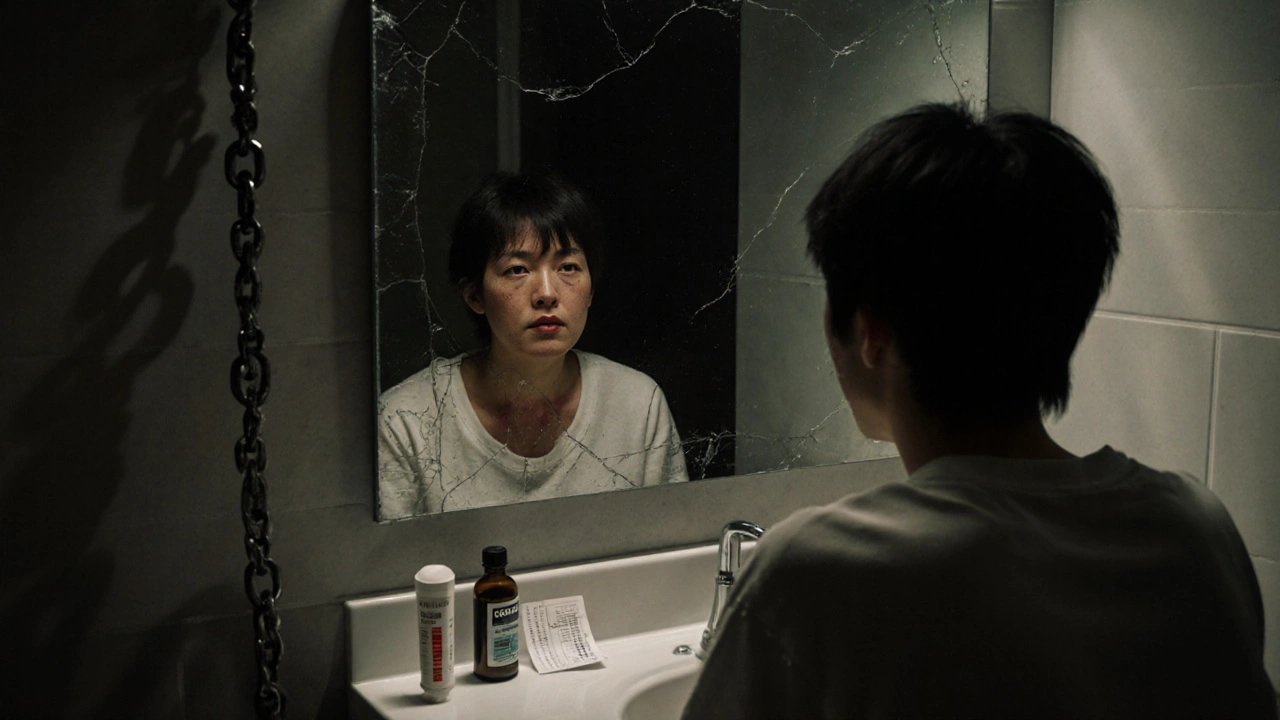
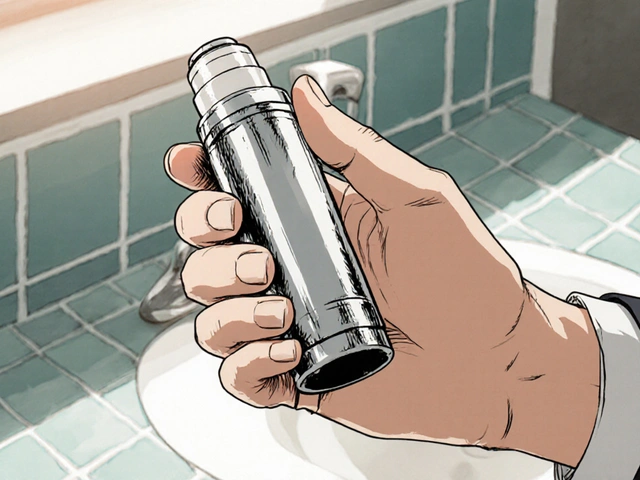

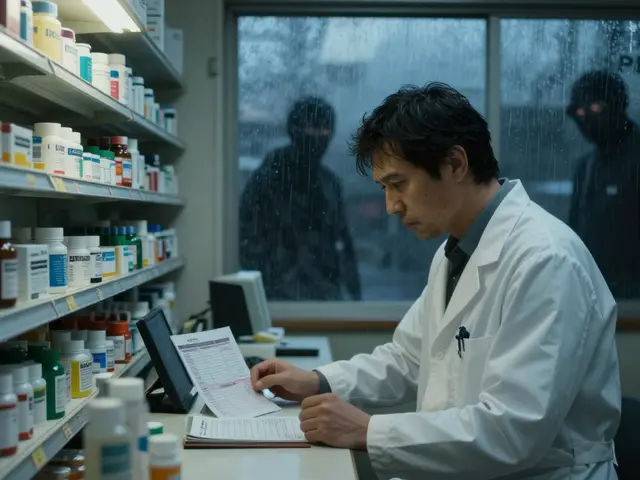

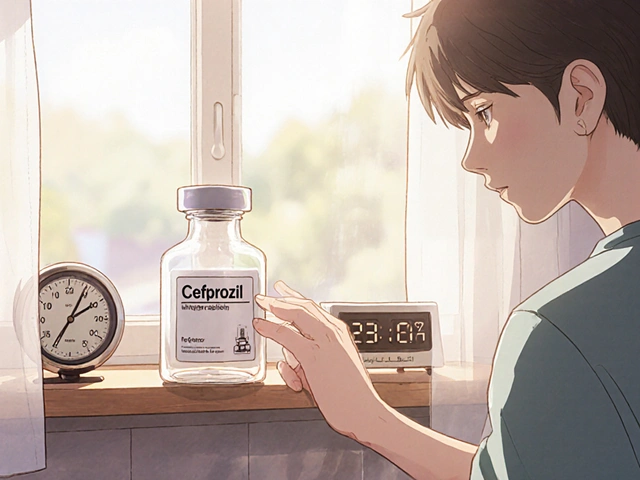
Robin Annison
November 1, 2025 at 23:09
It’s funny how we treat acne like it’s a moral failing. Like if you have cystic acne, you didn’t try hard enough. But the truth? Your skin doesn’t care about your discipline. It just responds to biology. Isofair isn’t magic-it’s just chemistry working the way it’s supposed to. And for people who’ve spent years drowning in benzoyl peroxide and failed antibiotics? It’s not a last resort. It’s a lifeline.